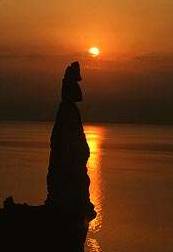My eyes scream for vision
my ears ring with silence
my lungs choke mid-breath
no longer able to hide it
I seek out the un-seeable
desire the unacquired
find rest in my pursuited quest
little solace, little respire
Aspiring for the infinite
drowning in falsifiers
making wage against a current
feeling cold, soaked and tired
Glimpsing at the light
distant stars off in the night
blotted by a dusty cloud
scared, lonely, running loud
Where did the sun once shine?
when did its days resign?
what happened to its might
now but a man's lost right
Do creatures still exist
seeking safety, truth and bliss?
young men with short beards grey,
sweetening words that blot dismay?
I miss my friends
I miss them all
seekers of truth,
warriors with gall
Fiery minds
whose coal burned slow,
lights in the darkness
an eternal glow
"Where did this brave man go?"
I asked each at a time
“Where are those dreams, of greater themes
Whose essence never lie?”
"To whom do you refer?
I cannot recall such a face...
it couldn't be my own!
Surely, you're making a mistake"
"No, don't you remember?"
I whispered with a tear
"This was you last Rosh Hashana;
This was you last holy year"
Many do remember
others do recall
but a vast majority
continue to ignore me
paralyzed within their fall
“Grab Hold!” I scream loud and clear
fighting against the waves
“It’s not too late!
You can be safe,
Just trust, have heart and pray!”
But how can one man make,
an impression all alone
when roaring waves and thundering quakes
leave seeds once firm unsown
Adrift about the cultural storm
Where trending is the mend
Where can a man who’s lost his plan
Summon strength to build again?
Think back to a time
Where lights in darkness
shed eternal glow.
How did that spark
set us apart
that long, long time ago?
From where did it originate?
Oh Yes! I do recall!
Was it not amidst communal unity,
The Community!
When each man gave his all?
You see, my friend, we sit together,
Both suffering in the dark
But only because,
we’re each unwilling
To ignite our inner spark
You see, my brother, the masses' power
Lies deep in the hearts of men.
The keys to the ease of harmonies
Exist here and now – not then
So grab ahold of your own soul
and join me on the way
To reclaim Light that created your might
That led you to this day

